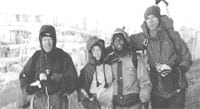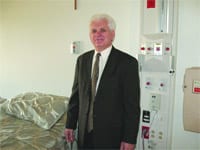Peak Performance Area Climber Will Take On Russia’s Rugged Mount Elbrus To Battle Breast Cancer
In the summer of 2004, Laurie Normandeau went to great lengths (Tanzania in eastern Africa) to help combat breast cancer — and great heights as well.
Specifically, 19,340 feet. That’s the summit of Mount Kilimanjaro, which she reached with a team of climbers as part of the Climb to Fight Breast Cancer, a program initiated by the Seattle-based Fred Hutchinson Cancer Research Center (FHCRC).
Normandeau said the climb was rewarding on a number of levels — from the personal achievement of scaling Africa’s highest mountain to the $10,000 she raised for breast cancer research in the process, to the dozens of letters of she received from the relatives of breast cancer victims expressing their gratitude for her hard work and sacrifice.
“It really was an incredible experience, something I’ll never forget,” she said, adding that the expedition so inspired her that she signed on for another climb this summer.
In July, she will part of a team of 12 to take on Mount Elbrus in Russia, an 18,500-foot double-cone volcano that she believes will prove more challenging that Kilimanjaro because of the nature of the climbing.
In fact, she will soon be attending mountaineering school for training in glacier crossing, crevasse-rescue techniques, and other skills she’ll need for the assault on Elbrus, the tallest mountain in Europe.
In the meantime, she is taking on the other challenge that is part of this program — raising the $10,000 each climber must amass for breast cancer research, as well as the projected $5,000 in expenses she will accrue. She is just over half-way to that goal, and has a number of initiatives planned for raising the balance, including a silent auction in Northampton’s Look Park on March 21.
The assault on Elbrus, or the ‘Russia Expedition’ as it’s called, is one of eight ascents this summer that will comprise the 2006 edition of the FHCRC’s Climb to Fight Breast Cancer. Other teams will take on Kilimanjaro, and also Mount Ranier, Mount Hood, Mount Baker, and Mount Adams in the Pacific Northwest.
“Right now, the focus is mostly on the fund-raising part of the challenge,” she said, noting that the actual training is progressive in nature and she has already started with some work-out regimens — hiking, weight-lifting, and rope-tying exercises, for example — that are designed to ready her for the ascent on Elbrus.
In May, she will head to Washington State for more intense training in the Cascade Mountains.
“We’ll be practicing on Mount Ranier, Mount Baker, and others,” she said. “We won’t be able to match the altitude of Elbrus, but we get a feel for the type of climbing we’ll be doing.”
A veteran climber, Normandeau said Elbrus will represent her sternest challenge to date. Reaching new heights, literally and figuratively, is just one of the many rewards that come with participation in the FHCRC program. Another is carrying the names of breast cancer victims with her on her banner as she makes her ascent.
Donations to the FHCRC were made in honor of those individuals, she told The Healthcare News, adding that seeing those names reminds her of the larger mission she is part of.
“Climbing in honor of people who are either battling the disease or have battled it, or in memory of someone who died from it, provides some real inspiration,” she explained. “You’re climbing for yourself, but also for them, and for everyone who has been impacted by breast cancer; it’s very powerful.”
Tax-deductible donations (checks should be made out to the Fred Hutchinson Cancer Research Center) can be mailed to Normandeau (97 Mount Road, Cummington, MA 01026. Donations can also be made online; www.fhcrc.org/climb





Comments are closed.